 W
WThe Abyss is a 1968 novel by the Belgian-French writer Marguerite Yourcenar. Its narrative centers on the life and death of Zeno, a physician, philosopher, scientist and alchemist born in Bruges during the Renaissance era. The book was published in France in 1968 and was met with immediate popular interest as well as critical acclaim, obtaining the Prix Femina with unanimous votes the year of its publication. The English translation by Grace Frick has been published under the title The Abyss or alternatively Zeno of Bruges. Belgian filmmaker André Delvaux adapted it into a film in 1988.
 W
WThe Abyssinian is a 1997 historical adventure novel by Jean-Christophe Rufin.
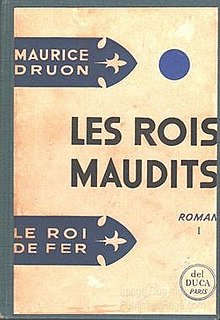 W
WThe Accursed Kings is a series of historical novels by French author Maurice Druon about the French monarchy in the 14th century. Published between 1955 and 1977, the series has been adapted as a miniseries twice for television in France.
 W
WAngélique, the Marquise of the Angels is a 1956 novel by Anne Golon & Serge Golon, the first novel in Angélique series. Inspired by the life of Suzanne de Rougé du Plessis-Bellière, known as the Marquise du Plessis-Bellière.
 W
WAt the Sign of the Reine Pédauque is a historical novel by Anatole France, written in 1892 and published the next year. The novel tells of the tribulations of the young Jacques Ménétrier at the beginning of the 18th century. Its most important source is the 17th-century occult text Comte de Gabalis.
 W
WBalzac and the Little Chinese Seamstress is a semi-autobiographical novel written by Dai Sijie, and published in 2000 in French and in English in 2001. A film based on his novel directed by Dai was released in 2002.
 W
WThe Battle is a historical novel by the French author Patrick Rambaud that was first published in 1997. The English translation by Will Hobson appeared in 2000. The book describes the 1809 Battle of Aspern-Essling between the French Empire under Napoleon and the Austrian Empire. The action in the novel follows closely historical observations and descriptions as seen from the French perspective. La Bataille is the first book of a trilogy by Rambaud about the decline of Napoleon, describing his first personal defeat in a European battle; the other two books cover Napoleon’s defeat in Russia in The Retreat and his banishment at Elba in Napoleon’s Exile.
 W
WThe Bridge over the River Kwai is a novel by the French novelist Pierre Boulle, published in French in 1952 and English translation by Xan Fielding in 1954. The story is fictional but uses the construction of the Burma Railway, in 1942–1943, as its historical setting, and is partly based on Pierre Boulle's own life experience working in Malaysia rubber plantations and later working for allied forces in Singapore and Indochina during World War II. The novel deals with the plight of World War II British prisoners of war forced by the Imperial Japanese Army to build a bridge for the "Death Railway", so named because of the large number of prisoners and conscripts who died during its construction. The novel won France's Prix Sainte-Beuve in 1952.
 W
WThe Charterhouse of Parma is a novel by Stendhal published in 1839. Telling the story of an Italian nobleman in the Napoleonic era and later, it was admired by Balzac, Tolstoy, André Gide, di Lampedusa and Henry James. It was inspired by an inauthentic Italian account of the dissolute youth of Alessandro Farnese. The novel has been adapted for opera, film and television.
 W
WDarling Caroline is a 1947 historical novel by the French writer Jacques Laurent. It portrays the adventures of a daring young woman at the time of the French Revolution. A popular hit, it was followed by several sequels.
 W
WDeath Is My Trade is a 1952 French fictionalized biographical novel by Robert Merle. The protagonist, Rudolf Lang, was closely based on the real Rudolf Höß, commandant of the concentration camp Auschwitz.
 W
WDésert is a 1980 novel written by French Nobel laureate writer J. M. G. Le Clézio, considered to be one of his breakthrough novels. It won the Académie française's Grand Prix Paul Morand in 1980.
 W
WDreams of My Russian Summers is a French novel by Andrei Makine, originally published in 1995. It won two top French awards, the Prix Goncourt and the Prix Médicis. The novel is told from the first-person perspective and tells the fictional story of a boy's memories and experiences with his French grandmother in the Soviet Union in the 1960s and '70s.
 W
WEmpress is a French biographical novel written by Shan Sa, a French author who was born in Beijing. It is based on the life of Empress Wu Zetian.
 W
WFable for Another Time is a 1952 novel by the French writer Louis-Ferdinand Céline. The narrative recounts Céline's experiences during what seems to be a hypothetical bombing of an area of Montmartre by the allies on the days preceding D-day. The whole of the action of this fairly long narrative lasts no more than twelve hours from the beginning of an evening to the morning after. It was followed by a sequel, Normance, published in 1954.
 W
WFortune de France is a sequence of 13 historical novels by French author Robert Merle, published between 1977 and 2003. The series is about 16th and 17th century France through the eyes of a fictitious Huguenot doctor-turned-spy Pierre de Siorac. It made Merle a household name in France, with the author repeatedly called the Alexandre Dumas of the 20th century. As of 2014, Fortune de France had sold over five million copies in France.
 W
WGuignol's Band is a 1944 novel by the French writer Louis-Ferdinand Céline. Set in the mid 1910s, the narrative revolves around Ferdinand, an invalided French World War I veteran who lives in exile in London, and follows his small businesses and interacting with prostitutes. It was followed by a sequel, London Bridge: Guignol's Band II, published posthumously in 1964.
 W
WHHhH is the debut novel of French author Laurent Binet, published in 2010 by Grasset & Fasquelle. The book recounts Operation Anthropoid, the assassination of Nazi leader Reinhard Heydrich in Prague during World War II. The novel was awarded the 2010 Prix Goncourt du Premier Roman.
 W
WThe Kindly Ones is a 2006 historical fiction novel written in French by American-born author Jonathan Littell. The book is narrated by its fictional protagonist Maximilien Aue, a former SS officer of French and German ancestry who helped to carry out the Holocaust and was present during several major events of World War II.
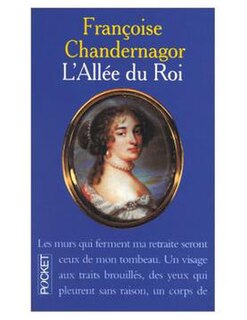 W
WThe King's Way is a novel by the French author Françoise Chandernagor first published in 1981. It is the story of Françoise d'Aubigné, marquise de Maintenon, who in the 17th century was almost the queen of France. It follows her destiny, from her birth in a prison in Niort and her poor childhood, to a marriage to a disabled poet, and her life in the court of Louis XIV, king of France, where she became his companion and finally his wife.
 W
WThe Last of the Just is a post-war novel by André Schwarz-Bart originally published in French in 1959. It was published in an English translation by Stephen Becker in 1960. It was Schwarz-Bart's first book and won the Prix Goncourt, France's highest literary prize. The author was the son of a Polish Jewish family murdered by the Nazis and he based the story on a Hebrew legend.
 W
WMan's Fate is a 1933 novel written by André Malraux. It was translated into English twice, both translations appearing in 1934, one by Haakon Chevalier under the title Man's Fate, published by Harrison Smith & Robert Haas in New York and republished by Random House as part of their Modern Library from 1936 on, and the other by Alastair MacDonald under the title Storm in Shanghai, published by Methuen in London and republished, still by Methuen, in 1948 as Man's Estate, to become a Penguin pocket in 1961. Currently the Chevalier translation is the only one still in regular print. The novel is about the failed communist insurrection in Shanghai in 1927, and the existential quandaries facing a diverse group of people associated with the revolution. Along with Les Conquérants and La Voie Royale, it forms a trilogy on revolution in Asia.
 W
WMemoirs of Hadrian is a novel by the Belgian-born French writer Marguerite Yourcenar about the life and death of Roman Emperor Hadrian. First published in France in French in 1951 as Mémoires d'Hadrien, the book was an immediate success, meeting with enormous critical acclaim. Although the historical Hadrian wrote an autobiography, it has been lost.
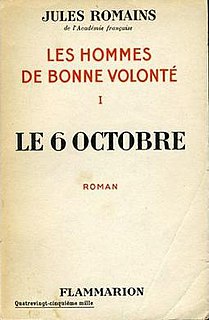 W
WLes Hommes de bonne volonté is an epic roman-fleuve by French writer Jules Romains, published in 27 volumes between 1932 and 1946. It has been classified both as a novel cycle and a novel and, at two million words and 7,892 pages, has been cited as one of the longest novels ever written.
 W
WLes Misérables is a French historical novel by Victor Hugo, first published in 1862, that is considered one of the greatest novels of the 19th century.
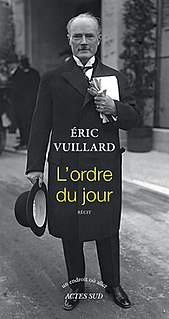 W
WThe Order of the Day is a novel by the French writer Éric Vuillard. In French it is described as a récit, while The Guardian described it as an historical essay with literary flourishes. Benjamin Welton reviewed the book in The New York Journal of Books 24 Sept. 2018 as " bad history imbued with pop psychology and adorned with purple prose riddled with unnecessary diversions."
 W
WThe Passionate Heart is a 1952 novel by Béatrix Beck, which won the Prix Goncourt. It was published in the UK as The Priest (1953) and in the US as The Passionate Heart (1953).
 W
WQuerelles de famille is a novel by Georges Duhamel published in 1932 by Mercure de France, dedicated to Roger Martin du Gard.
 W
WLe Rouge et le Noir is a historical psychological novel in two volumes by Stendhal, published in 1830. It chronicles the attempts of a provincial young man to rise socially beyond his modest upbringing through a combination of talent, hard work, deception, and hypocrisy. He ultimately allows his passions to betray him.
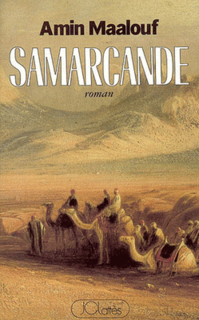 W
WSamarkand, written by French-Lebanese writer Amin Maalouf, is a 1988 historical fiction novel that revolves around the 11th-century Persian poet Omar Khayyám and his poetry collection Rubaiyat. The novel received the Prix Maison de la Presse.
 W
WThe Three Musketeers is a historical adventure novel written in 1844 by French author Alexandre Dumas. It is in the swashbuckler genre, which has heroic, chivalrous swordsmen who fight for justice.
 W
WTwenty Years After is a novel by Alexandre Dumas, first serialized from January to August 1845. A book of The d'Artagnan Romances, it is a sequel to The Three Musketeers (1844) and precedes the 1847–1850 novel The Vicomte de Bragelonne.
 W
WThe Vicomte of Bragelonne: Ten Years Later is a novel by Alexandre Dumas. It is the third and last of The d'Artagnan Romances, following The Three Musketeers and Twenty Years After. It appeared first in serial form between 1847 and 1850.